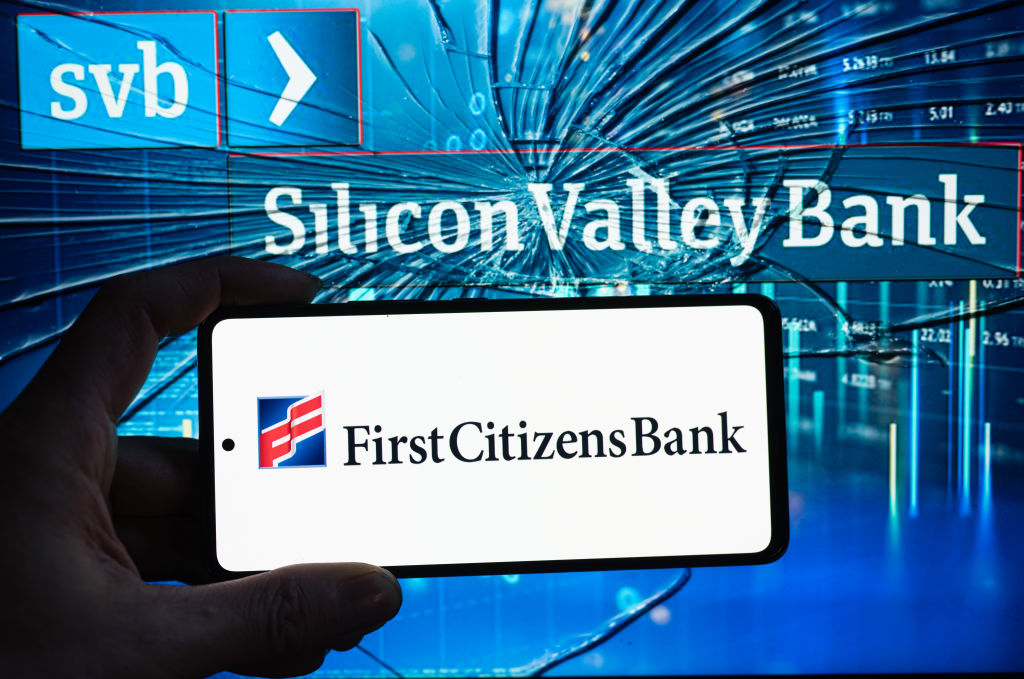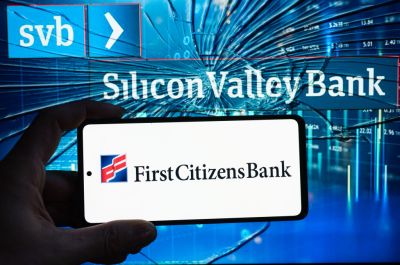Federal regulators began looking for a new owner for Silicon Valley Bank shortly before the run that shut it down and prompted the government to take over. Now they’ve found one: North Carolina-based First Citizens.
First Citizens announced Monday it agreed to purchase $56 billion worth of deposits previously owned by SVB. (SVB had $175 billion in deposits before its failure.) That’ll push First Citizens deposits to $145 billion, making it one of the 20 largest banks in the U.S. with slightly more in assets than what SVB had before its failure. It also purchased $72 billion worth of loans—for only $55 billion.
But First Citizens did not assume ownership of SVB’s $90 billion in securities, which includes most of the low-yielding U.S. Treasury bonds that got SVB into trouble when the cash-strapped bank was forced to sell them at a loss. The Federal Deposit Insurance Corporation (FDIC) will maintain control over the $90 billion in securities.
From the perspective of SVB’s worried depositors, the purchase means little: Those who remained with SVB will become First Citizens customers, though the Federal Reserve already promised that all depositors would be made whole after SVB’s crash.That included even customers with deposits more than the $250,000 FDIC insured amount. While in the past, the government has bailed out entire banks, effectively ensuring all depositors were made whole, reimbursing depositors above the insured amount is unusual.
With a YouGov poll published in January of this year finding that only 7 percent of Americans have more than $100,000 in savings—spread across all savings accounts—it’s relatively rare for an FDIC-insured bank failure to cause individuals to lose money above the insured amount. (Businesses’ accounts are insured up to the same amount, though it’s not possible to determine what percent of businesses keep that amount of cash on hand.)
In cases where bank failure causes depositors to lose above the insured amount, a buyer for the bank may cover depositors’ losses. If that doesn’t happen though, uninsured funds will be reimbursed only if there are sufficient funds from the liquidation of remaining assets. In the case of SVB, First Citizens won’t be on the hook for covering uninsured deposits. (Disclaimer: The Dispatch was a Silicon Valley Bank customer.)
The money for the bailout of account holders came from the federal Deposit Insurance Fund, which insured banks pay into to guarantee deposits for this exact situation. Treasury officials have said the fund has more than $100 billion, so it can also cover uninsured deposits of both SVB and Signature Bank—another regional bank that failed around the same time. The FDIC estimates that SVB’s failure has cost the Depositor Insurance Fund $20 billion. The Federal Reserve’s statement announcing that all depositors would be made whole also noted that while taxpayers will not be directly on the hook, “Any losses to the Deposit Insurance Fund to support uninsured depositors will be recovered by a special assessment on banks, as required by law.”
The new ownership deal doesn’t mean the end of the FDIC’s involvement with SVB, though. The FDIC will cover half of any losses First Citizens incurs above $5 billion derived from the SVB’s commercial loans. First Citizens has also set up a $70 billion line of credit with the FDIC to ensure it has cash on hand if its customers make a run on the bank. These moves are meant to reassure the banking community, and the public, at a time in which several midlevel regional banks have faltered. While First Citizens has by all accounts gotten quite the deal with the SVB purchase, the FDIC also gets shares of First Citizens worth up to $500 million. Bloomberg reported that with First Citizens’ stock drastically increasing after the purchase, the FDIC is already seeing the value of its shares increase.
While the bank side of SVB has been sold off, other, the FDIC did not assume control of the parent company SVB Financial, which is seeking to sell its other assorted parts, such as SVB Capital and SVB Securities, don’t yet have new owners.







Please note that we at The Dispatch hold ourselves, our work, and our commenters to a higher standard than other places on the internet. We welcome comments that foster genuine debate or discussion—including comments critical of us or our work—but responses that include ad hominem attacks on fellow Dispatch members or are intended to stoke fear and anger may be moderated.
With your membership, you only have the ability to comment on The Morning Dispatch articles. Consider upgrading to join the conversation everywhere.